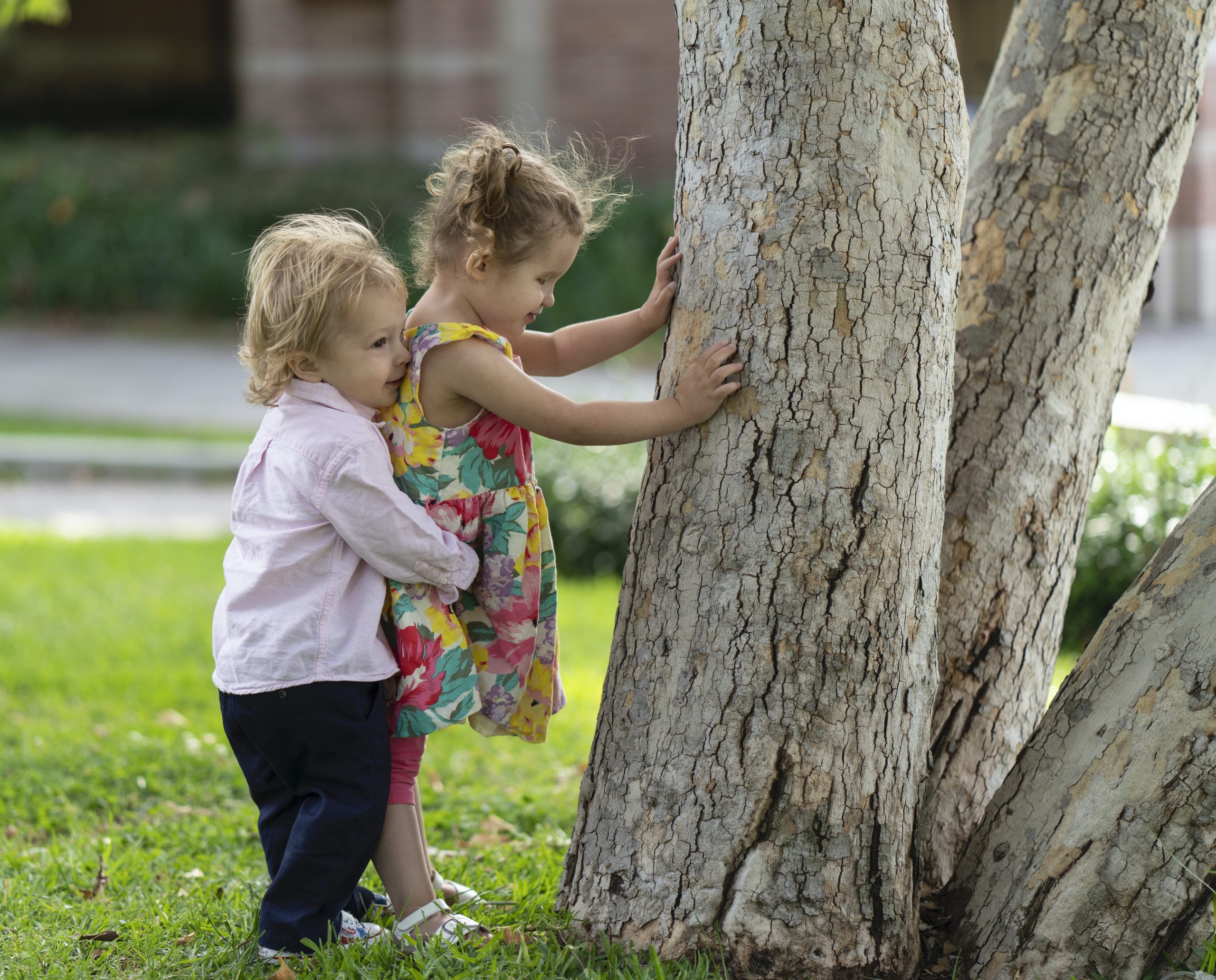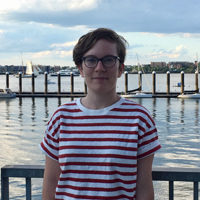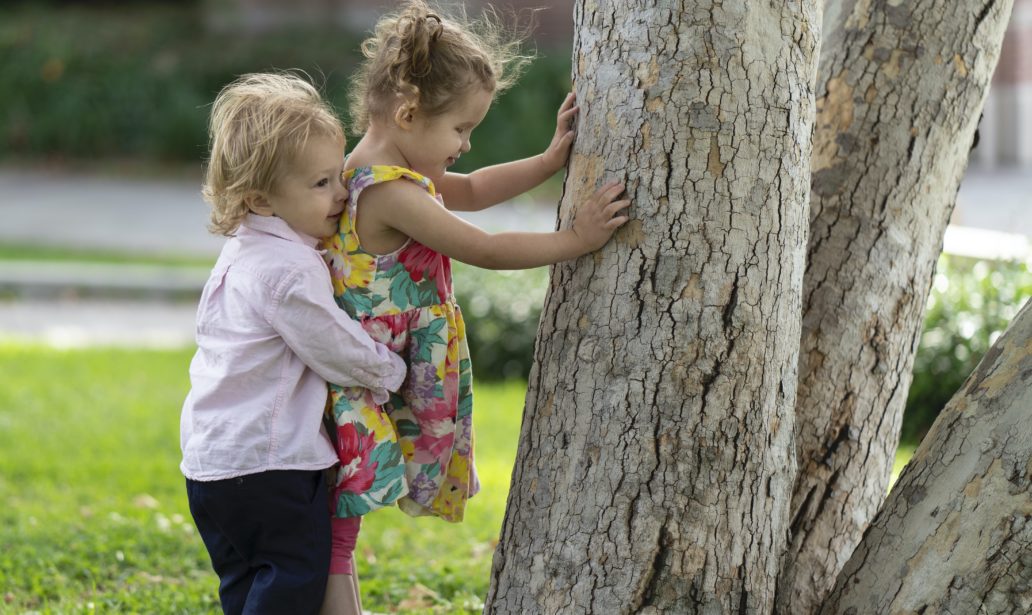Jennifer Silvers, Ph.D., is an Assistant Professor in the Developmental and Social areas of the Psychology Department at UCLA as well as at UCLA’s Brain Research Institute. She is the Principal Investigator for the Social Affective Neuroscience and Development (SAND) Lab, which studies how children, adolescents, and adults regulate their emotions and the effects of early adverse social experiences on emotional development.
We connected with Dr. Silvers through shared interests–our lab studies language development in blind and visually impaired children, and Dr. Silvers is a parent of two young children, one of whom is blind.
Tell me a little bit about your family.
My partner and I met in grad school, 13 years ago, but because in academia it takes a very long time before you wind up somewhere semi-stable, we delayed having kids for a little bit. Three and a half years ago, we had our first child, Ellie, who is a delight. She has been 100 percent blind since birth, which has produced a variety of interesting experiences and adventures for all of us. A year and eight months ago, our son Sebastian was born. We also have a dog, Sally, who we adopted 7 years ago. She’s the preferred family member for both Ellie and Sebastian.
What was the process for receiving a diagnosis for Ellie?
We didn’t have any expectation of disability while I was pregnant. After she was born, we noticed that she wasn’t opening her eyes in the hospital, and we started to inquire about it, and actually, none of the doctors seemed to notice, which was a little strange. So we kind of pushed, and they examined her a little more carefully and then started to realize that her eyeballs had not fully developed. This is a diagnosis typically referred to as either microphthalmia or anophthalmia–basically, lack of, or very small eyeballs. It was very challenging, that first period of time right after she was born. It was very shocking and very upsetting and scary, but, we knew, right from the start, that she was blind. Over time, I think in some ways, it helped us to just start off with that ground truth, and to know immediately the types of services she might need to learn blindness-specific skills and to kind of adapt and compensate for her lack of vision. We knew right off the bat that we wanted her to be a happy, successful, well-rounded blind person. Rather than fighting her disability, we were just working with it. We knew within 24 – 48 hours after her birth that she was either going to be severely visually impaired or 100 percent blind and we realized soon thereafter, she was 100 percent blind, which is very unusual.
Did Ellie start to receive early intervention services right away? What was your experience like?
We met with a social worker in the hospital right after she was born. They gave us referrals for various types of services. In California, the primary provider of early intervention services is Regional Center, so we reached out to them. Typically they don’t work with blind children right when they’re born, because usually you have to wait to see if a child is going to exhibit developmental delays. Their primary groups that they work with are individuals with developmental disabilities, intellectual disabilities, or individuals with autism. We called Regional Center and made an argument for why blindness should be included as a category of disability where we strongly suspected that she was going to be at risk for a variety of delays if she didn’t get early intervention services. Then we also connected with the LA Unified school district, which was our provider for a teacher for the visually impaired. She was assigned a Teacher for the Visually Impaired (TVI), who was phenomenal, when she was six weeks old and started working with her immediately, and now she’s in preschool through LA Unified.
What do services look like for a baby that’s so young?
For the first few months, a lot of it was just teaching us about things to expect down the road and things that we can be doing with her. I think that, for someone who is a developmental psychologist, most of what we learned in those first months was not hugely surprising–it was “talk to your child a lot, but like, really a lot.” Basically we never stopped talking. Already my husband and I are verbal people, but it was obsessive amounts of narration. We just got used to explaining absolutely everything, trying to introduce concepts in multi-modal ways, so not just thinking about pointing and saying “look over there,” which you would do with a sighted child, but having her touch everything, having her smell everything that we could. Trying to get her to integrate the fact that when she hit the ground with her fist, it felt a certain way and also sounded a certain way. So, just trying to build whatever bridges we could to try to get her to care about the world around her. I think when they’re that young, a lot of early intervention deals with motor development because that’s so much of what young children do, and basic sensory development.
What are your earliest or best memories of a two-way street of communication?
When Ellie was seven weeks old, I said something like “Mama loves,” and she reached up and touched my face for the first time–she put both hands on my face and just smiled at me and I was like “This is amazing!” The first few weeks with a newborn kind of suck no matter what–they’re just not that interesting. And that was really the first time that I felt like there was a true bi-directional connection happening. Then she started giggling, which was super adorable.
Are there ways that you have adapted your style of communication to bring Ellie into the fold?
We try not to do anything that doesn’t include her. Sometimes we mess up, like when Sebastian makes a face and I just burst out laughing. But a lot of it comes down to two things that have occurred over time–one is I ask her a lot what’s going on. I discovered that, much to my surprise, Ellie is observing a whole lot that I wasn’t aware she is observing. Blind children can learn a lot through observation. I think we often assume they don’t because to sighted people, observation sometimes becomes equated with watching visually, and that’s not necessarily the case for everyone. She knows a lot of what’s going on just by listening. It’s been really interesting to discover that she’s much more attuned than Sebastian to every utterance I make. Even things I’m not really aware of, like she can tell who it is that’s walking down the hall from across the apartment. She knows who is in the apartment at any time, what they’re doing, and what they’re holding. She knows a lot more of what’s going on then we realize.
The other thing is that we describe a lot more automatically at this point. I think that first year of nonstop narration has stuck, such that when we’re sitting at the dinner table, I’ll laugh at something Sebastian does, and then I’ll be like, “Ellie, Sebastian is doing that silly thing where he holds his spoon up to his mouth but doesn’t eat with it!” And then she bursts out laughing. She knows if I say, “Where’s Sebastian?” that he’s playing peekaboo, and she’ll cover her eyes. A lot of it is just saying something to clue her in.
What does accessibility look like for your family and what are some of the accommodations that make a difference to you?
We think about this a lot. Ideally, accessibility means that everybody has access to the same information and opportunities. It doesn’t mean that they access that information or those experiences in exactly the same way, but that they have similar options. I see that in small and large ways throughout the world. Netflix made it an option this year to change the speed of their content to play faster and slower, which is something that the National Federation for the Blind and the National Association of the Deaf endorsed, because it facilitates people who use lip reading and it facilitates blind people listening to things at different speeds, particularly if you’re using audio descriptions.
The other day, the kids had a Zoom birthday party for one of her friends. They sent a package to each of the kids and then they all played baby BINGO, where there were pictures of animals with their name underneath them. The hosts brailled Ellie’s card for her, which was super thoughtful. She’s obviously too young to read braille reliably but she knows what braille is and she knows how to track it and she was just so thrilled that Sebastian had his card and she had hers. She was finding the braille in each of the cells and talking about it. That was a great example of somebody making an effort to make something accessible.
In social settings, we try to teach people that when they come up to Ellie, they should always say who they are, so that she’s as aware of what’s going on as others are.

What is Ellie’s preschool like?
LA Unified offers a preschool classroom devoted to visually impaired children where they have built-in services for all the things she could need. She’s been doing it all on Zoom, and she’s doing great. She really likes it. She knows how to open up her brailler, she knows how to find her buttons, she’s working on pushing one at a time. She’s learned how to find braille on the page and follow it left to right, and track down to the next line. She can now differentiate between two braille symbols–she doesn’t know what they all are yet, but that’s huge progress in a few months. Three times a week, her class integrates with another classroom over Zoom. She has an amazing caregiver, who is our former weekend babysitter. She sits side-by-side with Ellie in all of her Zoom classes and reinforces all of the lessons.
Do you feel like you would have a different experience if you lived somewhere else?
I do wonder about what services would look like in a smaller area. Blindness is such a low-incidence disability and the LA school district is the second-biggest school district in the country and they have three preschools for visually impaired kids. In her class, there are only two kids, and in the biggest class there are ten. If they’re serving roughly 20 kids her age across the second biggest district in the country, I’m not sure what it would look like if we were somewhere more rural. In these younger years when she’s learning these incredibly specialized skills, I think it’s helpful to be in a place where there are some people who look like you and where there’s so much expertise.
Do you have any stories that you can share that might be interesting to other parents?
When her brother was first born, she was so thrilled about the baby in my belly, and then as soon as he came out, we said “Ellie, meet your brother!” She touched him and then looked at us and said “All done, baby” and then turned away and refused to speak to me for about a month after that. She was so annoyed that I brought him into our home. But just to show that sibling relationships can evolve, last night we asked her before she went to bed if there was anything she wanted to tell us, and she touched Sebastian and said “I love baby.” So I will say, if parents have one child who is disabled, my best advice is to have another child. I think that for some folks, when they have a disabled child, they feel like they need to devote all of the attention they have in the world to that child’s development, and I completely resonate with that feeling. But I think sometimes the best thing you can do for a disabled child is to give them a healthy dose of normal. And if there’s one person who will not treat them special, it’s a younger sibling, who just doesn’t care. They’re going to be annoying, they’re going to pull their hair, they’re going to steal their toys. At least in our family, for Ellie, that was so helpful–she was used to every adult telling her how incredible she was, and I think Sebastian gives her a nice healthy dose of balance.

Hallie Garrison
INTERVIEWER
Hallie graduated from Bryn Mawr College in 2013 with a B.A. in Sociology. She moved to Boston to work in childcare for three years, where she developed an interest in infant language acquisition. Hallie likes books, bikes, and beautiful places!
Elika Bergelson
Principal Investigator
